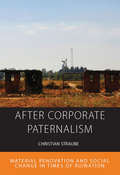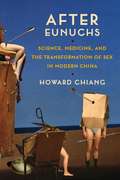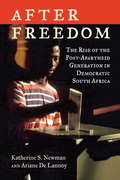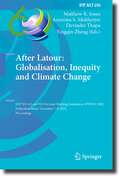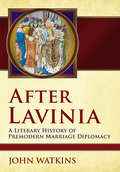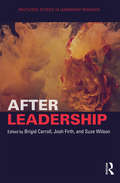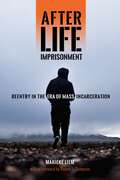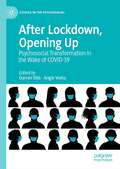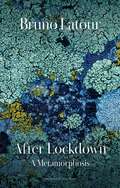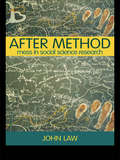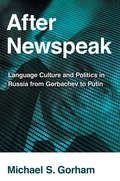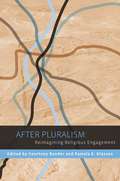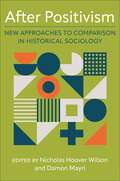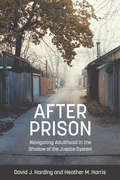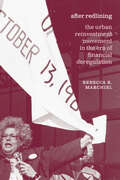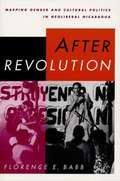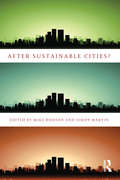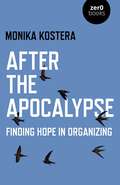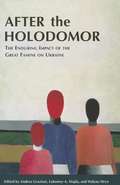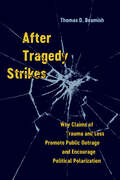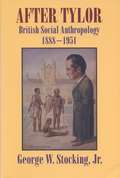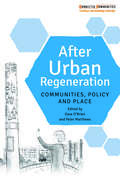- Table View
- List View
After Corporate Paternalism: Material Renovation and Social Change in Times of Ruination (Integration and Conflict Studies #24)
by Christian StraubeIn this ethnographic study of post-paternalist ruination and renovation, Christian Straube explores social change at the intersection of material decay and social disconnection in the former mine township Mpatamatu of Luanshya, one of the oldest mining towns on the Zambian Copperbelt. Touching on topics including industrial history, colonial town planning, social control and materiality, gender relations and neoliberal structural change, After Corporate Paternalism offers unique insights into how people reappropriate former corporate spaces and transform them into personal projects of renovation, fundamentally changing the characteristics of their community.
After Defeat: How the East Learned to Live with the West (Cambridge Studies in International Relations)
by Ayşe ZarakolNot being of the West; being behind the West; not being modern enough; not being developed or industrialized, secular, civilized, Christian, transparent, or democratic - these descriptions have all served to stigmatize certain states through history. Drawing on constructivism as well as the insights of social theorists and philosophers, After Defeat demonstrates that stigmatization in international relations can lead to a sense of national shame, as well as auto-Orientalism and inferior status. Ayşe Zarakol argues that stigmatized states become extra-sensitive to concerns about status, and shape their foreign policy accordingly. The theoretical argument is supported by a detailed historical overview of central examples of the established/outsider dichotomy throughout the evolution of the modern states system, and in-depth studies of Turkey after the First World War, Japan after the Second World War, and Russia after the Cold War.
After Eunuchs: Science, Medicine, and the Transformation of Sex in Modern China
by Howard ChiangFor much of Chinese history, the eunuch stood out as an exceptional figure at the margins of gender categories. Amid the disintegration of the Qing Empire, men and women in China began to understand their differences in the language of modern science. In After Eunuchs, Howard Chiang traces the genealogy of sexual knowledge from the demise of eunuchism to the emergence of transsexuality, showing the centrality of new epistemic structures to the formation of Chinese modernity.From anticastration discourses in the late Qing era to sex-reassignment surgeries in Taiwan in the 1950s and queer movements in the 1980s and 1990s, After Eunuchs explores the ways the introduction of Western biomedical sciences transformed normative meanings of gender, sexuality, and the body in China. Chiang investigates how competing definitions of sex circulated in science, medicine, vernacular culture, and the periodical press, bringing to light a rich and vibrant discourse of sex change in the first half of the twentieth century. He focuses on the stories of gender and sexual minorities as well as a large supporting cast of doctors, scientists, philosophers, educators, reformers, journalists, and tabloid writers, as they debated the questions of political sovereignty, national belonging, cultural authenticity, scientific modernity, human difference, and the power and authority of truths about sex. Theoretically sophisticated and far-reaching, After Eunuchs is an innovative contribution to the history and philosophy of science and queer and Sinophone studies.
After Freedom
by Katherine S. Newman Ariane De LannoyTwenty years after the end of apartheid, a new generation is building a multiracial democracy in South Africa but remains mired in economic inequality and political conflict. This spring, South Africa will celebrate the twentieth anniversary of the fall of apartheid and the first free elections. Although the country has come far, frustration is growing as inequalities that once divided the races now grow within them. In After Freedom, award-winning sociologist Katherine S. Newman and South African expert Ariane De Lannoy profile seven people--Black, White, "Coloured," and immigrant--to reveal what life is like in South Africa today. These on-the-ground portraits offer an intimate look at the rising generation of young people and explore what the complex political landscape means to the average person. After Freedom is a timely look at how the generation that came of age post-apartheid is grappling with a tenuous democracy in a globalized economy.
After Hitler: Recivilizing Germans, 1945-1995
by Konrad H. Jarausch Konrad HunzikerIn the spring of 1945, as the German army fell in defeat and the world first learned of the unspeakable crimes of the Holocaust, few would have expected that, only half a century later, the Germans would emerge as a prosperous people at the forefront of peaceful European integration. How did the Germans manage to recover from the shattering experience of defeat in World War II and rehabilitate themselves from the shame and horror of the Holocaust? In After Hitler, Konrad H. Jarausch shows how Germany's determination to emphasize civility and civil society, destroyed by the Nazi regime,helped restore the demoralized nation during the post-war period. Unlike other intellectual inquiries into German efforts to deal with the Nazi past, After Hitler primarily focuses on the practical lessons a disoriented people drew from their past misdeeds, and their struggle to create a new society with a sincere and deep commitment to human rights. After Hitler offers a comprehensive view of the breathtaking transformation of the Germans from the defeated Nazi accomplices and Holocaust perpetrators of 1945 to the civilized, democratic people of today's Germany.
After Latour: IFIP WG 8.2 and WG 9.4 Joint Working Conference, IFIPJWC 2023, Hyderabad, India, December 7–8, 2023, Proceedings (IFIP Advances in Information and Communication Technology #696)
by Matthew R. Jones Yingqin Zheng Arunima S. Mukherjee Devinder ThapaThis book constitutes the refereed proceedings of the IFIP WG 8.2 and WG 9.4 Joint Working Conference on After Latour: Globalisation, Inequity and Climate Change, IFIPJWC 2023, held in Hyderabad, India, during December 7–8, 2023. The 15 full papers presented together with 13 short papers were carefully reviewed and selected from 60 submissions. They are organized in topical sections as follows: climate change and digital sustainability; ICT’s and sustainable development; IS in the education sector; privacy, trust, and surveillance; theories and methods.
After Lavinia: A Literary History of Premodern Marriage Diplomacy
by John WatkinsThe Renaissance jurist Alberico Gentili once quipped that, just like comedies, all wars end in a marriage. In medieval and early modern Europe, marriage treaties were a perennial feature of the diplomatic landscape. When one ruler decided to make peace with his enemy, the two parties often sealed their settlement with marriages between their respective families. In After Lavinia, John Watkins traces the history of the practice, focusing on the unusually close relationship between diplomacy and literary production in Western Europe from antiquity through the seventeenth century, when marriage began to lose its effectiveness and prestige as a tool of diplomacy.Watkins begins with Virgil's foundational myth of the marriage between the Trojan hero Aeneas and the Latin princess, an account that formed the basis for numerous medieval and Renaissance celebrations of dynastic marriages by courtly poets and propagandists. In the book's second half, he follows the slow decline of diplomatic marriage as both a tool of statecraft and a literary subject, exploring the skepticism and suspicion with which it was viewed in the works of Spenser and Shakespeare. Watkins argues that the plays of Corneille and Racine signal the passing of an international order that had once accorded women a place of unique dignity and respect.
After Leadership (Routledge Studies in Leadership Research)
by Brigid Carroll Suze Wilson Josh FirthLeadership studies today resembles a bewildering diversity of theories, concepts, constructs and approaches, struggling in huge part for meaning, relevance and impact. As Dennis Tourish so eloquently puts it, much of the literature suffers from ‘unrelenting triviality’ and ‘sterile preoccupations’. Seeking to create a clean break from this current state of leadership studies, After Leadership begins with the premise of a post-apocalyptic world where only fragments of ‘leadership science’ now remain, echoing Alisdair McIntyre’s imagining of such a scene as the basis for re-establishing the foundations and focus of moral theory. From these fragments, the authors seek to construct a new leadership studies that challenges much of the established thinking on leadership, exposes its limitations and biases, and, most importantly, seeks to construct the foundations of a more inclusive, participatory, bold, relational and social platform for leadership in the future. After Leadership thus imagines a brave new world where what leadership is and what we seek from it can be developed anew, rather than remaining bound up in the problematic traditions and preoccupations that characterise leadership studies today. Offering both full length chapter explorations that explore new ways of understanding and practicing leadership, as well as shorter essays that aim to provoke further reflection on leadership and what we seek of it, After Leadership offers a uniquely critical and creative collection that will inspire students, scholars and leadership educators to reconsider their understanding and practice of leadership.
After Life Imprisonment: Reentry in the Era of Mass Incarceration (New Perspectives in Crime, Deviance, and Law #13)
by Marieke LiemOne out of every ten prisoners in the United States is serving a life sentence—roughly 130,000 people. While some have been sentenced to life in prison without parole, the majority of prisoners serving ‘life’ will be released back into society. But what becomes of those people who reenter the everyday world after serving life in prison?In After Life Imprisonment, Marieke Liem carefully examines the experiences of “lifers” upon release. Through interviews with over sixty homicide offenders sentenced to life but granted parole, Liem tracks those able to build a new life on the outside and those who were re-incarcerated. The interviews reveal prisoners’ reflections on being sentenced to life, as well as the challenges of employment, housing, and interpersonal relationships upon release. Liem explores the increase in handing out of life sentences, and specifically provides a basis for discussions of the goals, costs, and effects of long-term imprisonment, ultimately unpacking public policy and discourse surrounding long-term incarceration. A profound criminological examination, After Life Imprisonment reveals the untold, lived experiences of prisoners before and after their life sentences.
After Lockdown, Opening Up: Psychosocial Transformation in the Wake of COVID-19 (Studies in the Psychosocial)
by Darren Ellis Angie VoelaThis edited volume examines the psychosocial transformations experienced during the COVID-19 pandemic and lockdown, and envisions those that might lead to a more equitable society as we ‘open up’. The book integrates psychoanalysis, sociology, cultural studies, and psychology to address three main areas: personal experiences of the lockdown, new formations of power and desire that the lockdown has shaped, and global concerns related to the pandemic. Within those three areas, the chapters discuss key themes that include the uses of space during lockdown; experiences of death, loss, and domestic violence; race and the pandemic; technology, media, and viral media; chronic illness; handwashing and COVID-19; and conspiracy theories.Drawing together academics and practitioners with a common vision of social justice and active pedagogy, the contents of this volume combine experiential writing with cutting-edge, theoretically-informed interdisciplinary debates. The book advances and demonstrates the productive diversity of psychosocial studies, drawing on psychoanalytic theories, critical psychologies, critical theories, critical race theories, process philosophies, affect theories, and critical pedagogy. In doing so, it will appeal to scholars across the social sciences.
After Lockdown: A Metamorphosis
by Bruno LatourAfter the harrowing experience of the pandemic and lockdown, both states and individuals have been searching for ways to exit the crisis, many hoping to return as soon as possible to ‘the world as it was before the pandemic’. But there is another way to learn the lessons of this ordeal: as inhabitants of the earth, we may not be able to exit lockdown so easily after all, since the global health crisis is embedded in another larger and more serious crisis – that brought about by the New Climate Regime. Learning to live in lockdown might be an opportunity to be seized: a dress-rehearsal for the climate mutation, an opportunity to understand at last where we – inhabitants of the earth – live, what kind of place ‘earth’ is and how we will be able to orient ourselves and exist in this world in the years to come. We might finally be able to explore the land in which we live, together with all other living beings, begin to understand the true nature of the climate mutation we are living through and discover what kind of freedom is possible – a freedom differently situated and differently understood. In this sequel to his bestselling book Down to Earth, Bruno Latour provides a compass for this necessary re-orientation of our lives, outlining the metaphysics of confinement and deconfinement with which we will all be obliged to come to terms by the strange times in which we are living.
After Method: Mess in Social Science Research (International Library of Sociology)
by John LawJohn Law argues that methods don't just describe social realities but are also involved in creating them. The implications of this argument are highly significant. If this is the case, methods are always political, and it raises the question of what kinds of social realities we want to create. Most current methods look for clarity and precision. It is usually said that only poor research produces messy findings, and the idea that things in the world might be fluid, elusive, or multiple is unthinkable. Law's startling argument is that this is wrong and it is time for a new approach. Many realities, he says, are vague and ephemeral. If methods want to know and help to shape the world, then they need to reinvent themselves and their politics to deal with mess. That is the challenge. Nothing less will do.
After Newspeak: Language Culture and Politics in Russia from Gorbachev to Putin
by Michael S. GorhamIn After Newspeak, Michael S. Gorham presents a cultural history of the politics of Russian language from Gorbachev and glasnost to Putin and the emergence of new generations of Web technologies. Gorham begins from the premise that periods of rapid and radical change both shape and are shaped by language. He documents the role and fate of the Russian language in the collapse of the USSR and the decades of reform and national reconstruction that have followed. Gorham demonstrates the inextricable linkage of language and politics in everything from dictionaries of profanity to the flood of publications on linguistic self-help, the speech patterns of the country's leaders, the blogs of its bureaucrats, and the official programs promoting the use of Russian in the so-called "near abroad."Gorham explains why glasnost figured as such a critical rhetorical battleground in the political strife that led to the Soviet Union's collapse and shows why Russians came to deride the newfound freedom of speech of the 1990s as little more than the right to swear in public. He assesses the impact of Medvedev's role as Blogger-in-Chief and the role Putin's vulgar speech practices played in the restoration of national pride. And he investigates whether Internet communication and new media technologies have helped to consolidate a more vibrant democracy and civil society or if they serve as an additional resource for the political technologies manipulated by the Kremlin.
After Pluralism: Reimagining Religious Engagement (Religion, Culture, and Public Life)
by Pamela E. Klassen Eds. Bender CourtneyThe contributors to this volume treat pluralism as a concept that is historically and ideologically produced or, put another way, as a doctrine that is embedded within a range of political, civic, and cultural institutions. Their critique considers how religious difference is framed as a problem that only pluralism can solve. Working comparatively across nations and disciplines, the essays in After Pluralism explore pluralism as a "term of art" that sets the norms of identity and the parameters of exchange, encounter, and conflict. <P><P>Contributors locate pluralism's ideals in diverse sites-Broadway plays, Polish Holocaust memorials, Egyptian dream interpretations, German jails, and legal theories-and demonstrate its shaping of political and social interaction in surprising and powerful ways. Throughout, they question assumptions underlying pluralism's discourse and its influence on the legal decisions that shape modern religious practice. Contributors do more than deconstruct this theory; they tackle what comes next. Having established the genealogy and effects of pluralism, they generate new questions for engaging the collective worlds and multiple registers in which religion operates.
After Positivism: New Approaches to Comparison in Historical Sociology
by Wilson, Nicholas Hoover; Mayrl, DamonWhat is the value of comparison for research in historical sociology? Today, social scientists regularly express doubt about the positivist premises that have long justified comparison’s use: that cases can be unproblematically compared as though they are independent of one another, that comparison can reliably yield valid causal inference, and that comparative methods can grapple with questions of meaning, sequence, and process that are central to historical explanation. Yet they remain reluctant to abandon comparison altogether, not least because comparisons are still manifestly useful in the research process.After Positivism presents a bold new set of warrants and methodologies for comparison that takes these criticisms fully into account. The contributors to this book marshal a wide array of postpositivist approaches to knowledge to reconstruct the analytic potential of comparison for a new generation of social scientists. In addition to providing fresh answers to classic questions about case selection and causal inference, authors ponder the role comparison plays in a world where social phenomena are demonstrably time-, space-, and concept-dependent; where causation is typically conjunctural; where social structures and groups emerge and die; and where important objects of inquiry can be understood only in terms of relationships, emergent properties, or contingent and irregular effects. Engaging and timely, this book will be of interest to all those who seek to improve our explanations of historical change in social-scientific research.
After Prison: Navigating Adulthood in the Shadow of the Justice System
by David J. Harding Heather M. HarrisThe incarceration rate in the United States is the highest of any developed nation, with a prison population of approximately 2.3 million in 2016. Over 700,000 prisoners are released each year, and most face significant educational, economic, and social disadvantages. In After Prison, sociologist David Harding and criminologist Heather Harris provide a comprehensive account of young men’s experiences of reentry and reintegration in the era of mass incarceration. They focus on the unique challenges faced by 1,300 black and white youth aged 18 to 25 who were released from Michigan prisons in 2003, investigating the lives of those who achieved some measure of success after leaving prison as well as those who struggled with the challenges of creating new lives for themselves. The transition to young adulthood typically includes school completion, full-time employment, leaving the childhood home, marriage, and childbearing, events that are disrupted by incarceration. While one quarter of the young men who participated in the study successfully transitioned into adulthood—achieving employment and residential independence and avoiding arrest and incarceration—the same number of young men remained deeply involved with the criminal justice system, spending on average four out of the seven years after their initial release re-incarcerated. Not surprisingly, whites are more likely to experience success after prison. The authors attribute this racial disparity to the increased stigma of criminal records for blacks, racial discrimination, and differing levels of social network support that connect whites to higher quality jobs. Black men earn less than white men, are more concentrated in industries characterized by low wages and job insecurity, and are less likely to remain employed once they have a job. The authors demonstrate that families, social networks, neighborhoods, and labor market, educational, and criminal justice institutions can have a profound impact on young people’s lives. Their research indicates that residential stability is key to the transition to adulthood. Harding and Harris make the case for helping families, municipalities, and non-profit organizations provide formerly incarcerated young people access to long-term supportive housing and public housing. A remarkably large number of men in this study eventually enrolled in college, reflecting the growing recognition of college as a gateway to living wage work. But the young men in the study spent only brief spells in college, and the majority failed to earn degrees. They were most likely to enroll in community colleges, trade schools, and for-profit institutions, suggesting that interventions focused on these kinds of schools are more likely to be effective. The authors suggest that, in addition to helping students find employment, educational institutions can aid reentry efforts for the formerly incarcerated by providing supports like childcare and paid apprenticeships. After Prison offers a set of targeted policy interventions to improve these young people’s chances: lifting restrictions on federal financial aid for education, encouraging criminal record sealing and expungement, and reducing the use of incarceration in response to technical parole violations. This book will be an important contribution to the fields of scholarly work on the criminal justice system and disconnected youth.
After Prison: Navigating Adulthood in the Shadow of the Justice System
by David J. Harding Heather M. HarrisThe incarceration rate in the United States is the highest of any developed nation, with a prison population of approximately 2.3 million in 2016. Over 700,000 prisoners are released each year, and most face significant educational, economic, and social disadvantages. In After Prison, sociologist David Harding and criminologist Heather Harris provide a comprehensive account of young men’s experiences of reentry and reintegration in the era of mass incarceration. They focus on the unique challenges faced by 1,300 black and white youth aged 18 to 25 who were released from Michigan prisons in 2003, investigating the lives of those who achieved some measure of success after leaving prison as well as those who struggled with the challenges of creating new lives for themselves. The transition to young adulthood typically includes school completion, full-time employment, leaving the childhood home, marriage, and childbearing, events that are disrupted by incarceration. While one quarter of the young men who participated in the study successfully transitioned into adulthood—achieving employment and residential independence and avoiding arrest and incarceration—the same number of young men remained deeply involved with the criminal justice system, spending on average four out of the seven years after their initial release re-incarcerated. Not surprisingly, whites are more likely to experience success after prison. The authors attribute this racial disparity to the increased stigma of criminal records for blacks, racial discrimination, and differing levels of social network support that connect whites to higher quality jobs. Black men earn less than white men, are more concentrated in industries characterized by low wages and job insecurity, and are less likely to remain employed once they have a job. The authors demonstrate that families, social networks, neighborhoods, and labor market, educational, and criminal justice institutions can have a profound impact on young people’s lives. Their research indicates that residential stability is key to the transition to adulthood. Harding and Harris make the case for helping families, municipalities, and non-profit organizations provide formerly incarcerated young people access to long-term supportive housing and public housing. A remarkably large number of men in this study eventually enrolled in college, reflecting the growing recognition of college as a gateway to living wage work. But the young men in the study spent only brief spells in college, and the majority failed to earn degrees. They were most likely to enroll in community colleges, trade schools, and for-profit institutions, suggesting that interventions focused on these kinds of schools are more likely to be effective. The authors suggest that, in addition to helping students find employment, educational institutions can aid reentry efforts for the formerly incarcerated by providing supports like childcare and paid apprenticeships. After Prison offers a set of targeted policy interventions to improve these young people’s chances: lifting restrictions on federal financial aid for education, encouraging criminal record sealing and expungement, and reducing the use of incarceration in response to technical parole violations. This book will be an important contribution to the fields of scholarly work on the criminal justice system and disconnected youth.
After Redlining: The Urban Reinvestment Movement in the Era of Financial Deregulation (Historical Studies of Urban America)
by Rebecca K. MarchielAmerican banks, to their eternal discredit, long played a key role in disenfranchising nonwhite urbanites and, through redlining, blighting the very city neighborhoods that needed the most investment. Banks long showed little compunction in aiding and abetting blockbusting, discrimination, and outright theft from nonwhites. They denied funds to entire neighborhoods or actively exploited them, to the benefit of suburban whites—an economic white flight to sharpen the pain caused by the demographic one. And yet, the dynamic between banks and urban communities was not static, and positive urban development, supported by banks, became possible. In After Redlining, Rebecca K. Marchiel illuminates how, exactly, urban activists were able to change some banks’ behavior to support investment in communities that they had once abandoned. The leading activists arose in an area hit hard by banks’ discriminatory actions and politics: Chicago’s West Side. A multiracial coalition of low-and moderate-income city residents, this Saul Alinsky–inspired group championed urban reinvestment. And amazingly, it worked: their efforts inspired national action, culminating in the federal Home Mortgage Disclosure Act and the Community Reinvestment Act. While the battle for urban equity goes on, After Redlining provides a blueprint of hope.
After Revolution: Mapping Gender and Cultural Politics in Neoliberal Nicaragua
by Babb Florence E.Nicaragua's Sandinista revolution (1979-1990) initiated a broad program of social transformation to improve the situation of the working class and poor, women, and other non-elite groups through agrarian reform, restructured urban employment, and wide access to health care, education, and social services. This book explores how Nicaragua's least powerful citizens have fared in the years since the Sandinista revolution, as neoliberal governments have rolled back these state-supported reforms and introduced measures to promote the development of a market-driven economy. Drawing on ethnographic research conducted throughout the 1990s, Florence Babb describes the negative consequences that have followed the return to a capitalist path, especially for women and low-income citizens. In addition, she charts the growth of women's and other social movements (neighborhood, lesbian and gay, indigenous, youth, peace, and environmental) that have taken advantage of new openings for political mobilization. Her ethnographic portraits of a low-income barrio and of women's craft cooperatives powerfully link local, cultural responses to national and global processes.
After Sustainable Cities?
by Simon Marvin Mike HodsonA sustainable city has been defined in many ways. Yet, the most common understanding is a vision of the city that is able to meet the needs of the present without compromising the ability of future generations to meet their own needs. Central to this vision are two ideas: cities should meet social needs, especially of the poor, and not exceed the ability of the global environment to meet needs.After Sustainable Cities critically reviews what has happened to these priorities and asks whether these social commitments have been abandoned in a period of austerity governance and climate change and replaced by a darker and unfair city. This book provides the first comprehensive and comparative analysis of the new eco-logics reshaping conventional sustainable cities discourse and environmental priorities of cities in both the global north and south. The dominant discourse on sustainable cities, with a commitment to intergenerational equity, social justice and global responsibility, has come under increasing pressure. Under conditions of global ecological change, international financial and economic crisis and austerity governance new eco-logics are entering the urban sustainability lexicon – climate change, green growth, smart growth, resilience and vulnerability, ecological security. This book explores how these new eco-logics reshape our understanding of equity, justice and global responsibility, and how these more technologically and economically driven themes resonate and dissonate with conventional sustainable cities discourse. This book provides a warning that a more technologically driven and narrowly constructed economic agenda is driving ecological policy and weakening previous commitment to social justice and equity. After Sustainable Cities brings together leading researchers to provide a critical examination of these new logics and identity what sort of city is now emerging, as well as consider the longer-term implication on sustainable cities research and policy.
After The Apocalypse: Finding Hope in Organizing
by Monika KosteraOur times of crumbling structures and decaying social bonds are often depicted as apocalyptic. This book takes the apocalypse as a metaphor to help us in the search for meaning in our everyday realities. Yes, the apocalypse is when social structures and institutions fall apart and we are terrified and suffocated by the debris raining down upon us. But 'apocalypse' also means 'revelation'. The very collapse reveals what dissipating institutions were constructed upon: where there ought to have been foundational common values, most often there is violence and raw power. Yet the values are there, too, and they can be found. This book is a guide to these values, showing how they can be of help to organizers and organizational dreamers.
After The Holodomor: The Enduring Impact Of The Great Famine On Ukraine (Harvard Papers In Ukrainian Studies #12)
by Nicolas Werth Jacques Vallin France Meslé Oleg Khlevniuk Andrea Graziosi Stanislav Kulchytskyi Robert 347 Nierz Roman Serbyn Yuri Shapoval Valerii Vasyliev Olexandra Veselova Lubomyr Hajda Oleh Wolowyna Roman Wysocki Hennadii Yefimenko Halyna Hryn Alexander Babyonyshev Karel Berkhoff Elena Boeck Hennadii Boriak Volodymyr Dibrova George Grabowicz Liudmyla HrynevychOver the last twenty years, a concerted effort has been made to uncover the history of the Holodomor, the Great Famine of 1932–1933 in Ukraine. Now, with the archives opened and the essential story told, it becomes possible to explore in detail what happened after the Holodomor and to examine its impact on Ukraine and its people. <p><p> In 2008 the Ukrainian Research Institute at Harvard University hosted an international conference entitled “The Great Famine in Ukraine: The Holodomor and Its Consequences, 1933 to the Present.” The papers, most of which are contained in this volume, concern a wide range of topics, such as the immediate aftermath of the Holodomor and its subsequent effect on Ukraine's people and communities; World War II, with its wartime and postwar famines; and the impact of the Holodomor on subsequent generations of Ukrainians and present-day Ukrainian culture. Through the efforts of the historians, archivists, and demographers represented here, a fuller history of the Holodomor continues to emerge.
After Tragedy Strikes: Why Claims of Trauma and Loss Promote Public Outrage and Encourage Political Polarization
by Thomas D. BeamishWhile trauma and loss can occur anywhere, most suffering is experienced as personal tragedy. Yet some tragedies transcend everyday life's sad but inevitable traumas to become notorious public events: de facto "public" tragedies. In these crises, suffering is made publicly visible and lamentable. Such tragedies are defined by public accusations, social blame, outpourings of grief and anger, spontaneous memorialization, and collective action. These, in turn, generate a comparable set of political reactions, including denial, denunciation, counterclaims, blame avoidance, and a competition to control memories of the event. Disasters and crises are no more or less common today than in the past, but public tragedies now seem ubiquitous. After Tragedy Strikes argues that they are now epochal—public tragedies have become the day's definitive social and political events. Thomas D. Beamish deftly explores this phenomenon by developing the historical context within which these events occur and the role that political elites, the media, and an emergent ideology of victimhood have played in cultivating their ascendence.
After Tylor: British Social Anthropology, 1888-1951
by George W. StockingA sequel to Victorian Anthropology, Stocking's widely acclaimed study of British anthropology and the Darwinian Revolution, After Tylor is the first comprehensive exploration of the intellectual transition that gave rise to modern British social anthropology.
After Urban Regeneration: Communities, Policy and Place (Connected Communities)
by Dave O'Brien and Peter MatthewsAfter Urban Regeneration is a comprehensive study of contemporary trends in urban policy and planning. Leading scholars come together to create a key contribution to the literature on gentrification, with a focus on the history and theory of community in urban policy. Engaging with debates as to how urban policy has changed, and continues to change, following the financial crash of 2008, the book provides an essential antidote to those who claim that culture and society can replicate the role of the state. Based on research from the UK Arts and Humanities Research Council’s Connected Communities programme and with a unique set of case studies drawing on artistic and cultural community work, the book will appeal to scholars and students in geography, urban studies, planning, sociology, law and art as well as policy makers and community workers.
